In Time Sly and the Family Stone Tab
Published on
May 31, 2016
Category
Features
Share
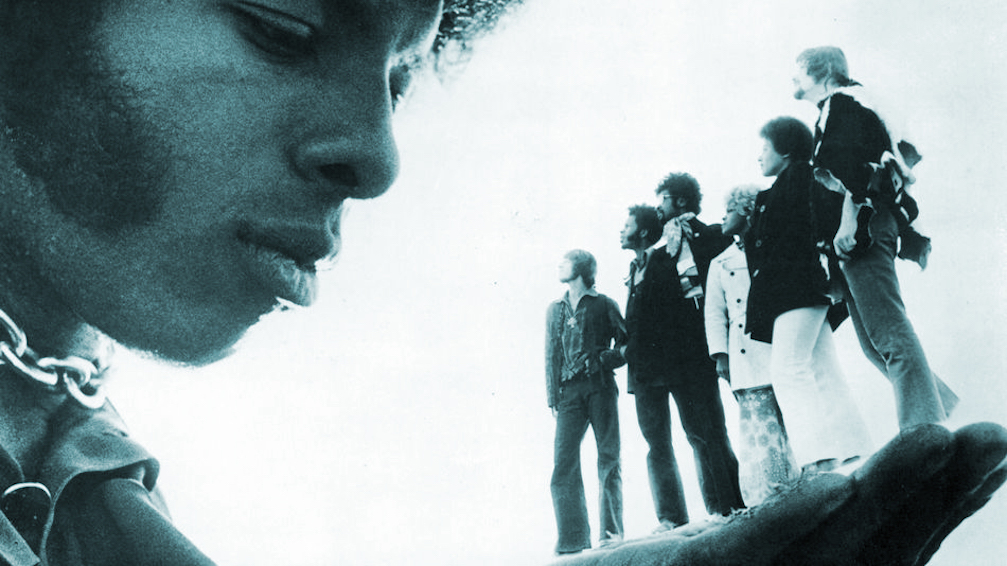
One of the most sociologically and stylistically integrated ensembles of all time, aught quite compares to Sly and the Family Stone. Here, Nate Patrin presents a recap of the band's greatest works and its indelible imprint on modernistic music.
Words: Nate Patrin
It almost seems preposterous to even bring upward the possibility that Sly & the Family Stone are underrated, at least to a diehard music fan or even a casual enthusiast who remembers their tardily '60s and early on '70s heyday. Merely fifty-fifty bookkeeping for all their influence, whether it's direct (Prince, Erykah Badu, D'Angelo) or by beatmaker proxy (they're 1 of the most-sampled acts of all time), it feels similar we notwithstanding demand periodic reminders of the band that was one of the near sociologically and stylistically integrated of its or most other times.
It could be Sly Stone'due south belatedly-life disappearing act and personal struggles that made his band's legacy a tricky one to uphold, or the fact that only two of their non-compilation albums – 1969's Stand! and 1971's At that place's a Riot Goin' On – were major hits (though 1973's Fresh had its share of momentum). Information technology could also exist the de facto radio segregation that left them out of the archetype stone catechism that the residuum of their Woodstock peers became enshrined in, or the fact that their peak came during the peaks of near every other boomer favorite's career. Or perhaps it was just because so many bands wound up doing what they did – some most as well – that the fact Sly & the Family Stone were the first and often the all-time to do those things became almost taken for granted.
So here'south a refresher course. As a racially and gender-integrated band with an indelible ensemble strength to back up a charismatic and talented idea human being, there wasn't actually anything quite like Sly & the Family Stone. Having two white members helped play upwards the ring's multicultural angle, but chops-wise they might as well have been Junior Walker (sax player Jerry Martini) and Clyde Stubblefield (drummer Gregg Errico). The other one-half of the horn department was a woman, Cynthia Robinson, who would be a titan from her outro to 'I Want to Have You College' lone. Bassist Larry Graham singlehandedly (or singlethumbedly) popularized the slapping fashion of playing, giving the ring the legendary bottom-end that put them right next to James Dark-brown (and arguably alee of him) in the annals of funk's creation. And the Stone siblings – fuzz-flinging guitarist Freddie, co-pb-singer/keyboardist Rose, and singer/songwriter/mastermind Sly – were the literal familial unit of measurement that invited every listener to their reunion. They were tight when they lasted; their peak as a unified ensemble was a mere two years from 1967 through '69, with the early '70s marked by as much intra-band conflict as it was by Sly-as-auteur luminescence.
Listen to the playlist and ringlet down to read about the records.
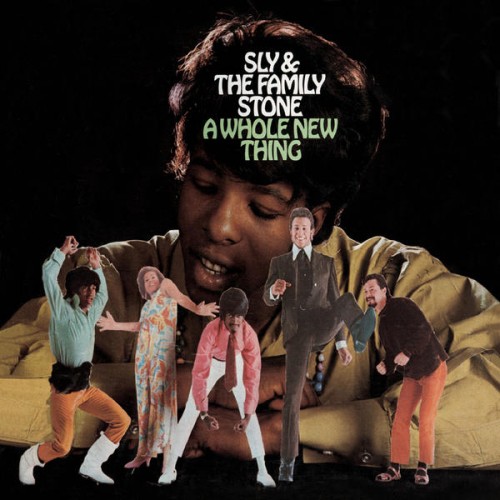
Sly and the Family Rock
A Whole New Matter
(Epic, 1967)
Listen / Buy
It's a little strange to think of A Whole New Thing equally a disquisitional and commercial flop, even if it does make a certain kind of comparative sense in the context of the Sly & the Family Stone catalogue. The only album up to that point left unrepresented on their 1970 Greatest Hits, New Thing is a lilliputian restrained compared to the formidable pop-stone-soul crossover ring they'd become past the fourth dimension they hit the stage at Woodstock. But their debut struck at an ideal time: with stone'south turn for the psychedelic positing musical progress as something increasingly disconnected with the spirit of rhythm & dejection, Sly & the Family unit Stone's hooky proto-funk took up the mantle of preserving that connection from another angle.
If zilch else, New Thing should at least be picked up for 'Underdog', the anthology-opening personal-every bit-political civil rights canticle that sounds exactly how the band'southward career should've kicked off in earnest. The Martini/Robinson horn department Staxes its fashion through a taunting 'Frere Jacques' riff earlier laying downwards punchy morse code in all caps, Errico and Graham lay down a backbone of liquid titanium, and Sly belts out like he can't focus on singing considering his words are both seething with frustration and yearning with empathy – then he just breathlessly proclaims. The vertiginous Sam-and-Dave-get-dosed freakout 'Trip to Your Eye' (famously sampled in LL's 'Mama Said Knock You Out') and the 3-in-the-morning adultery lament 'That Kind of Person' are additional highlights, while the filler cuts prove that even when they were all the same putting it together, their ensuing success already had a powerful tightness to build off.
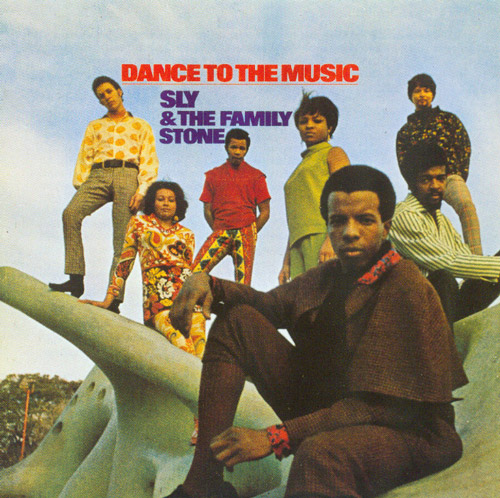
Sly and the Family unit Stone
Dance to the Music
(Ballsy, 1968)
Listen / Buy
After A Whole New Thing underperformed on the charts, CBS's Clive Davis prodded the Family unit Stone to make with the hits, nudging them towards a more commercial-friendly dance-band audio. And even if Sly wasn't thrilled with the thought of compromise, the resulting tape was less a sellout than a delay of the inevitable, an amplification of their more danceable side that would perfectly balance itself out with their heavier tendencies within a year.
In the meantime, at that place's some fifteen minutes' worth of party-fueling perfection: a title track that would tangle with Archie Bell & the Drells' 'Tighten Upward' for the honours of all-time meet-the-band dance anthem of early on '68, and its relentless, twelve-minute counterpart 'Dance to the Medley', which took danceable soul headlong into LP-length conceptual jamming and unknowingly created a prototype for the marathon uptempo R&B vamps that would lop the -theque off disco a couple years subsequently. And even every bit a directly-up party tape with fewer nods to social agitation and crafty songwriting, there are still some singular points of idiosyncrasy – check out the push-and-pull spine-twister 'I Ain't Got Nobody (For Real)' and the first-draft pes-stomper 'College', which simply lacks in comparison to the hurricane-force phenomenon information technology'd mutate into past Stand!
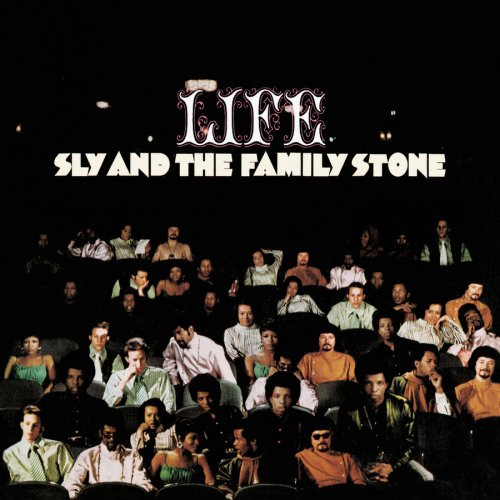
Sly and the Family Stone
Life
(Ballsy, 1968)
Mind / Buy
Tertiary time's the charm. With Life, Sly & the Family unit Stone coalesced into the band that jumps straight to nearly people'south minds when y'all drop their name, supernaturally tricky virtuosos who could take down anyone in a cutting session while bridging the gap between funk'due south Southern sweat and the melodic utopianism of NorCal bohemia. And even if that sound wouldn't become truly famous until the post-obit year, their independent, clear-eyed optimism took on the kind of motivational grade that was desperately necessary during the disillusioning trials of late '68: Put a smile on your confront / Exit that bummer behind; Don't allow a stranger sell you stories / Buyin' is cheap and and so is lyin'; Tell information technology like it is / You lot don't have to die before yous live.
The album wasn't a smash, only damn if the ring didn't try – every vocal on Life is a popular-ideal 3 ½ minutes or less, and yet they hit dead-on every time, whether it's with conceptual goofs that hibernate precipitous commentary ('I'yard an Beast'), lanky statements of purpose laced with enough out-in that location rubber-reinforced grooves to inform a lineage from Funkadelic to Fatboy Slim ('Into My Own Thing'), or psych-skirting funk excursions that have more fuzz than a lawn tennis brawl factory ('Dynamite!', 'Jane Is a Groupee'). They even get away with biting the Beatles on the 'Eleanor Rigby'- quoting 'Plastic Jim' – a marker of Sly's stylistic chuztpah that sounded as ambitious as it was clever. Also go along an ear out for 'Love Metropolis', in example you wanted a deep-cut case of their break-vanquish godhood.

Sly and the Family Stone
Live at the Fillmore E
(Epic, 1968/2015)
Listen / Buy
One of the big, inexplicable mysteries most the Sly & the Family unit Stone discography was the fact that there were most no commercially bachelor recordings of their concert appearances over the years, their atomic throwdown at Woodstock notwithstanding (and it took until 2009 for the whole fix to come out on The Woodstock Feel). The reason? Epic recorded an Oct '68 evidence as an intended stopgap release to aid market the and so still-low-charting band as a "you gotta hear 'em live" miracle, only to see 'Everyday People' intermission large a month after and point towards a next-level refinement for the ring. Assuming that going back to the '68 model of the Family Stone after Stand! was similar trying to sell a auto buyer on a stock Pontiac Bonneville later test-driving a GTO Judge, their Fillmore Due east testify was shelved and somehow never even resurfaced until Roots guitarist "Captain" Kirk Douglas was put in accuse of compiling together a what-if double-live LP for Tape Shop Mean solar day 2015 in accelerate of a more exhaustive CD box set later that year.
Douglas' set pares down the material to a strong approximation of what could've been constitute on a version Epic might've put out in '68 – at to the lowest degree, assuming they were willing to have a take a chance on a then-rare double-live. This composite of sets from the Family unit Stone'due south October 4th and fifth shows at the Fillmore East is the long-needed certificate of the band at their total power, when their nautical chart-fed stardom wasn't notwithstanding guaranteed and their drive was still fueled past hunger. So when you get Rose Stone singing Aretha Franklin'south early on secular hit 'Won't Be Long' or Sly channelling his inner Sam Cooke on Dance to the Music outtake turned smouldering show centrepiece 'We Honey All (Freedom)' or the band's then-modest catalogue extrapolated into a blistering, crowdpleasing repertoire, you go a ring whose future was uncertain simply played like they knew it would burn vivid.
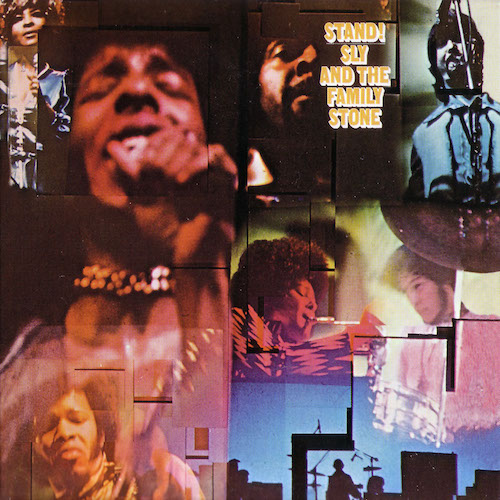
Sly and the Family Rock
Stand up!
(Epic, 1969)
Listen / Buy
Stand! isn't exactly a hard sell, even for neophytes: y'all get vi joyously defiant pop-soul classics, an explicit left-field argument on racism that doubles every bit the most 1972 song of 1969 ('Don't Call Me Nigger, Whitey'), and a well-nigh 14-minute vamp ('Sexual activity Machine') so evocative of the looming funk future that James Brown was driven to snatch its title. The culmination of everything Life gear up the phase for, Stand! is as anthemic, exclamatory, and demanding as its title suggests. And it points a new style forward with a vibrancy that only amplified the canyon-deep hole their absence would mean in the two years following. Imagine waiting for the followup to an album where a song every bit life-affirming equally 'Everyday People' is only perchance the best cut on the record.
Too, it's an incommunicable record to get ill of, especially since odds are you've at to the lowest degree heard parts of information technology at every turn. It's not just that this always-tight lineup was at their height when it came to the kind of funky breaks that would serve hip-hop and other sample-based producers well for decades. It'due south that there've been few records, funk, rock, or otherwise, that were then in tune with making sharp moments of melody or long-simmering rhythms so hard to milk shake. If the Jungle Brothers' 'Because I Got it Like That' hadn't sampled the circus organ/pulsate interruption in 'You lot Can Make information technology if You lot Try', if Black Milk hadn't chopped and rebuilt 'I Want to Take Yous Higher' for Pharoahe Monch'due south 'Permit's Get', if every producer ever hadn't institute aureate in the drums off 'Sing a Elementary Song'… well, those bits would probably notwithstanding be looping in your head anyways.
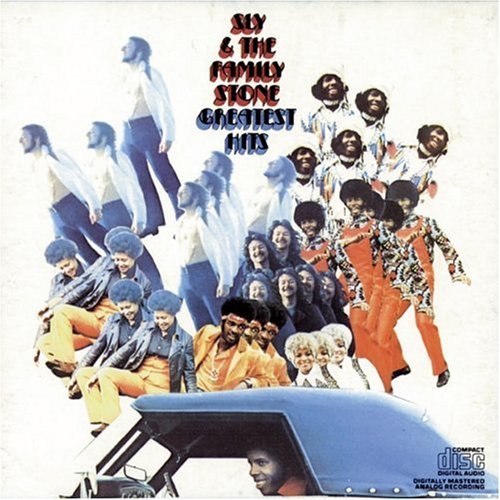
Sly and the Family Stone
Greatest Hits
(Epic, 1970)
Heed / Buy
If at that place was ever a case for calling the Greatest Hits format annihilation more than than a contract-fulfilling greenbacks grab, Sly & the Family Stone's fabricated it conspicuously. Going two years betwixt albums meant something more drastic in the studio-tour-studio grind of the 1960s and early '70s, so even as the band weren't technically hitmakers until 1969, 1970's Greatest Hits was put together to keep them in the public eye as Sly struggled to consummate In that location'due south a Riot Goin' On. Despite the high carryover of material from Stand! – v of the original album'due south cuts, most one-half of the compilation, comes from their breakthrough LP – its sequencing, the essential loftier points of their '68 singles and b-sides ('Life', 'Fun', 'Dance to the Music', and 'M'Lady'), and specially the inclusion of perchance their three about emotionally moving pre-Anarchism unmarried cuts make this one of the least redundant all-time-ofs ever made.
Only for the hazy afternoon floating-on-air reverie of 'Hot Fun in the Summertime', the dignified yet gutsy uplift of 'Everybody Is a Star', and the self-referential almost-bye of 'Cheers (Falettinme Exist Mice Elf Agin)' (dyin' immature is difficult to take / sellin' out is harder), Greatest Hits should exist the first identify you turn if you desire to know what made the band one of the smartest, catchiest, virtually transformative pop acts of the 1960s.
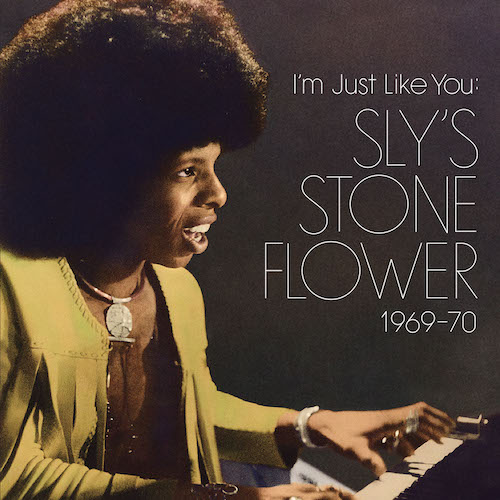
Sly and the Family unit Stone
I'm Just Similar You: Sly'due south Stone Flower 1969-seventy
(Light In The Attic, 2014)
Mind / Buy
Fifty-fifty as the Family unit threatened to splinter apart around him from internal dissent and creative roadblocks, even as the Stand up! followup tentatively titled Africa Talks to Yous hit speedbump after coke-bump, even as the music world was staring down the Finish of the Sixties, Sly Stone felt he had enough in the tank creatively and attention-wise to run his ain imprint label. Stone Flower Records was curt-lived plenty to fit its itemize on a double LP and have room left over for a handful of start-draft There's a Riot Goin' On sketches, merely it turned out to be a pretty fruitful sideline. Equally pure music, all of information technology written past Stone (though largely performed by others), it's somewhere between expert and fantastic; equally a side-route into an examination of Stone'south creative process between the recording of his ring's two biggest statement albums, it'southward priceless.
Just off historical curiosity alone, you lot've got fill-in singers Little Sister turning 'You're the 1' into proto-disco gold and 'Somebody's Watching You' into a successful field examination for the Rhythm Rex drum automobile, Sly's one-time acquaintance Joe Hicks belting out center-pained, homesick laments disguised as trip the light fantastic toe jams, and a short-lived New York ring chosen 6ix that was stripped down to a super-minimalist three-piece showcase for harmonica-player Marvin Braxton and vocaliser Charles Higgins ('I'm Just Like Yous'; 'Dynamite'). Few people heard these tracks; fewer still recognized them for the harbingers they were.
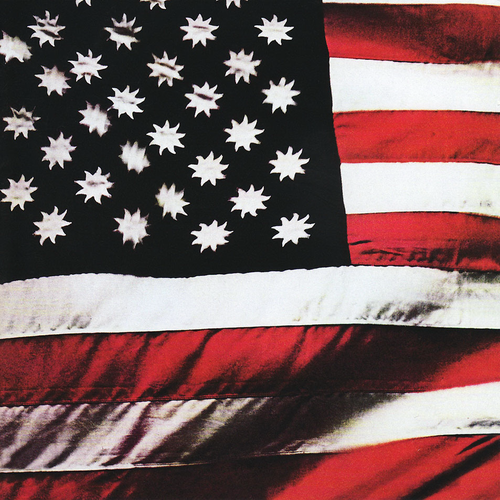
Sly and the Family Stone
There's a Riot Goin' On
(Epic, 1971)
Listen / Buy
A band indelibly continued with danceable, hot-blooded, life-affirming music in the tardily '60s made their fall '71 improvement with the opening sentiment feel so good inside myself don't want to motion – and if there was anybody who wasn't thrown by that, history hasn't made note of it. At that place's a Riot Goin' On was a nod to both Sly Stone'south peers and his antecedents, the championship positioned as a simultaneous reply to Marvin Gaye's months-prior What'southward Going On and an allusion to the Robins' Lieber/Stoller-penned dawn-of-rock 1954 single 'Riot in Cell Block Number 9'. Anarchism seemed to agree the weight of everything that went downwards in both Black pop and Blackness culture between those ii points, a retreat from motivational positivity and group-effort ensemble music into the auteurist austerity of ane burned out, overindulgent, all the same withal creatively rich human being trying to relearn his place in the world.
This is also where the divided nature of the band started to really manifest: Errico's door-kicking drums gave way for primordial, simple vanquish machines, the horn section was sawn-off instead of blaring when it showed up at all, most of the other ring members' contributions were played in isolation with Sly and overdubbed, and everything was stripped and erased and overlaid and ripped apart and rebuilt so much that the album became one of the biggest-budget, longest-in-the-making lo-fi albums any household proper noun would ever put out. This fabricated for the kind of isolated, anxious sonics that perfectly complemented Sly'southward g-yard-stare vocals and ruminations on the resilience he'd need to build to get in through an clashing tomorrow. The only thing left to practice is stand firm: blood's thicker than mud, the brave and strong survive, and refusing to motion is at least improve than running away.
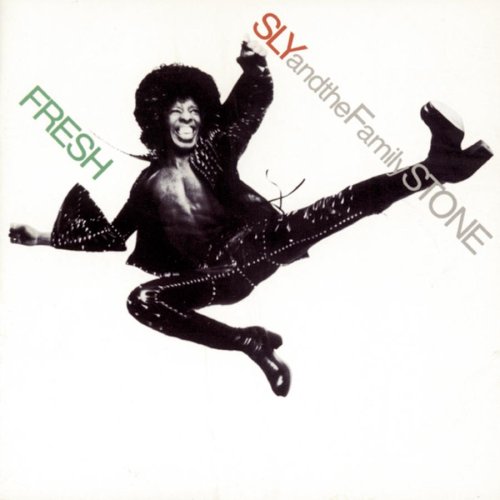
Sly and the Family Stone
Fresh
(Ballsy, 1973)
Listen / Buy
This might be the closest '70s Sly always got to revisiting the upbeat thrills of his '60s form – he's even making sure to look extra-light-headed during his Bruce Lee leaping kick on the Richard Avedon photo cover of Fresh, but in case listeners were even so wary of its predecessor's introverted anxiety. Just there's no turning dorsum from a record as bracing as Anarchism, and in splitting the difference between that album's jiff-snatching depth and his plain renewed turn towards the approachable, Fresh hinted at a phase that would prove both rejuvenating and sadly short-lived.
Released shortly after Sly's 30th birthday, Fresh could be looked at as some other step in an ongoing maturation endeavor if after career turns didn't dispiritingly, sometimes tragically derail those possibilities. 'If Y'all Want Me to Stay' was the big hit, the floor-staring withdrawal of Anarchism finally looking up to lock eyes and admit merely how difficult he'southward been, the horns hanging back in the cutting equally Sly, subbing for the on-the-outs Larry Graham, lays down a bassline then thick you can almost grab information technology from the speakers. 'Que Sera, Sera (Any Volition Be, Volition Exist)', the only cover in the band's discography, swaps out Doris Day treacle for Rose Stone dive bar gospel. And opener In Time is so nervy and agitated it found its groove while finding ways to hit all the fractions you could split up off The 1.
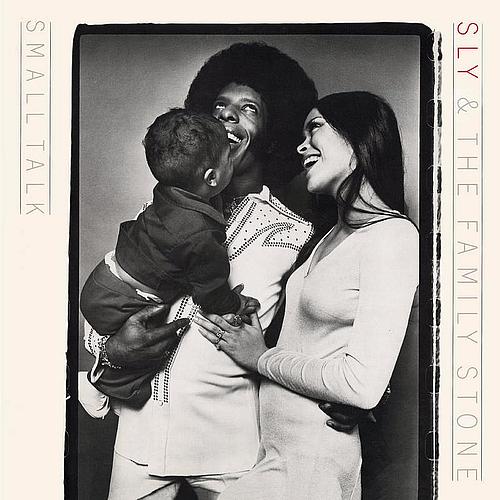
Sly and the Family unit Stone
Small Talk
(Ballsy, 1974)
Heed / Buy
The end of the line for Sly & the Family Stone as we knew it, Small Talk isn't a sore thwarting – any album with the meditative 'Time for Livin'" and the delirious 'Loose Haul' (turned into a hardcore burner and a Paul'due south Boutique building block respectively by the Beastie Boys) is worth digging out of the bin. Simply the feints towards new sonic flourishes – Rustee Allen is a solid Graham replacement on bass, and let'south hear it for Sid Folio calculation some actress pathos on violin – couldn't hide a flagging energy or the MPH lost off his lyrical fastball. Magnetic-poetry Sly Stone lyrics nevertheless beat a lot of artists' hard-worked verses, but growing from a bandleader to a scrambling Everything Human would've shown his seams even without a song like 'Can't Strain My Brain' to lay it bare.
Source: https://thevinylfactory.com/features/sly-and-the-family-stone-introduction/

0 Response to "In Time Sly and the Family Stone Tab"
Enregistrer un commentaire